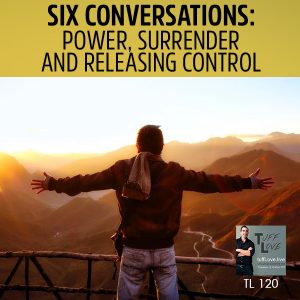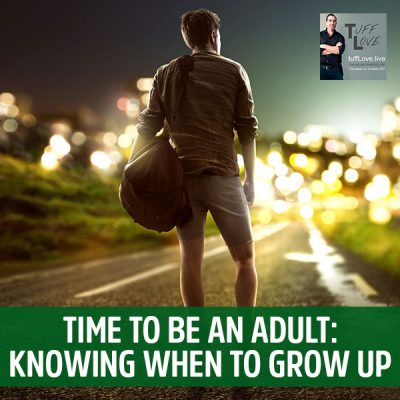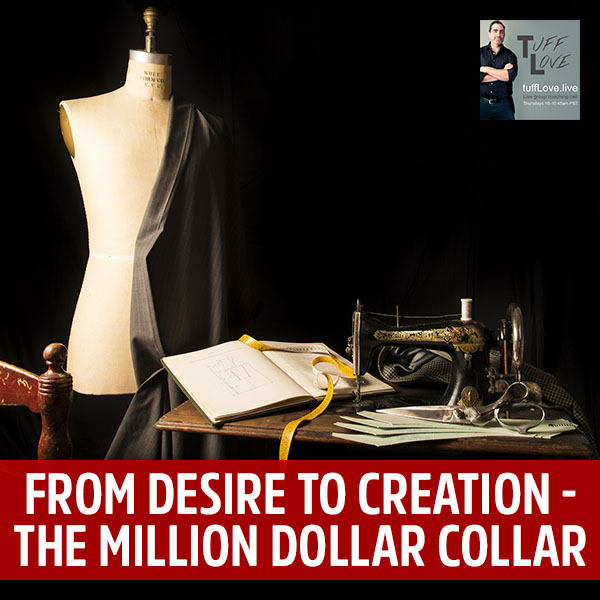
120: Six Conversations 2.3 – Power, Surrender and Releasing Control
Mar 16, 2018
Present-day women are faced with the challenge of balancing between their feminine and masculine side. While they lean towards their stronger and independent side in the workplace and social circles, they still want to stay connected with their soft and finer side. A lot of women actually like letting down their hair sometimes, taking the backseat, and releasing control over to men. Arielle and Jamie talk about what it takes to be a woman in today’s world and share that vulnerability and surrender doesn’t necessarily mean weakness.
—
This is episode 120, the third show of the second season of Six Vulnerable Conversations Between Two Women, my good friend Arielle and Jamie waxing the poetic around the concepts of power, surrender, and releasing control. I feel like a voyeur with two women sharing the deepest, darkest parts of themselves and I’m so grateful to be part of the show. For more shows, please visit TuffLove.Live. If you like the show, please visit us on iTunes. Give us a little review on Stitcher or your favorite podcast app, we’d appreciate it.
120: Six Conversations 2.3 – Power, Surrender and Releasing Control
Welcome to episode three of Six Vulnerable Conversations Between Two Women. We’re two women traveling the world old. I’m in Hawaii and Jamie is in San Diego. I love that we are able to continue this commitment to vulnerable conversations no matter where we are. It’s a beautiful thing. We got into the dark side of the Goddess Movement. We spoke on the role of victim archetype in romantic relationships. I witnessed peeling back the veil to these conversations that hold so much charge and simultaneously so much juice and freedom.
We’re going to be talking about power, surrender, and releasing control. I know for myself, this one holds a lot of weight because allowing myself to let go of control and create space for whether it’s men or universal energy to create an experience that I myself could not have planned through my desire to contort and force an effort has been an ever-evolving practice. I love for you to share a little bit about your relationship to this topic, Jamie.
It’s been an evolving practice for me as well. One of the biggest journeys of my life in personal development has been letting go of control. It’s been challenging for me so it’s something I enjoy speaking about because as I continue to let go of more control, more magic happens. I’m consistently surprised, delighted and inspired by both the events in my life and the way that people show up, specifically men.
That’s one thing that we’re going to be talking about here. It’s a very fascinating experiment for me of letting go of trying to make things happen and thinking that I can do things better and shifting my personal paradigm from being one of fairness and “it must be done the best way” to relaxing and getting to enjoy my experience of surrendering and being in my feminine when I allow someone else to take over, even if they’re a little bit sloppy with it sometimes and giving that grace.

Releasing Control: One of the biggest journeys of my life in personal development has been letting go of control.
You mentioned the word magic. It’s a word like so many of these buzzwords that can have so many different connotations. I get the sense that our definitions of magic are similar in a sense and it’s a part of what draws us together. I’d love to share what my feeling of magic is and this power. Being able to release, control, and surrender is a key element of experiencing this magic. Magic is the experience of knowing that we are constantly influencing and creating our reality based upon the thoughts, the beliefs, and the emotions that we experience around those things and what we transmit into the world.
Since we’re constantly creating our reality, why not do it intentionally in a way that creates something that we are genuinely fulfilled by, whether that is relationship, work, or purpose? The more that I have been able to let go of my fixed controlling agenda, that I know exactly how it’s supposed to be done, I know exactly how it’s supposed to play out, and if I don’t do it, nobody else will, it’s been through letting go of that attachment to knowing the answer that I have created space to invite in experiences that could not have mingled with me if I hadn’t released the grip and kept other things at a distance.
To add, there’s an element of being surprised that I enjoy. I found for a while, and I see this a lot in working with couples and relationships specifically, that there’s a way in which we know exactly how it’s going to go and there’s no magic in that. If we find ourselves in a situation where we know exactly how it’s going to go, there’s a chance that we’ve got our thumb on the forehead of the situation and we aren’t allowing for something new and surprising to occur, and much of the time people get bored. I found myself being like, “This relationship is boring,” before that is coming from my own generation of control of events, people, and the way that I’m reacting like modulating the way that I’m showing up such that it’s always the same. There’s no fun and play and surprise in that.
I love this conversation because what it’s bringing up in me is the realization. I had this point of realizing several years ago that I felt I could handle men without even being super aware of it. All of my actions were calculated to facilitate a certain experience that I knew how to create. What wound up happening, and this is the thing that I talk to women a lot about, is if we are handling every aspect of a relationship, it’s nearly impossible to respect the person that we are in relationship with because we’re operating on the underlying agenda that we know how to do it better than the third that we create in relation to each other.
A big part of the conversation that I have with a lot of women clients who are in relationships is that so much of the time, if we need to be the person in control, we’re going to either invite more femininity, more surrender in our partner or attract, if we’re heterosexual, men into our lives that have more of a softness and have more of a femininity to them because they are the compliment to the masculinity that we are embodying.
About three or four years ago, I would describe myself as a woman who has very ill-expressed forms of the masculine. I wanted to control my surroundings. I was very fixed. I was unwilling to allow a lot of surprise in my relationships. Most of the men that I attracted into my life, I wanted them to take control. I wanted them to lead. It’s been a process of me realizing I need to create a space. It’s not just that the man needs to show up differently because if this is what is happening, I’m playing an integral role in inviting the type of dynamic that I desire. I’m curious what your thoughts are on that.
I would love to talk about creating the space and how we do that. Through personal experience, I’m thinking of a boyfriend that I had previously. I was very detail-oriented, organized, business woman. Since I was nineteen, an only child, I can handle my shit and that was an identity. He was a little bit more random and could be what I felt like was messy. I felt his leadership wasn’t clean enough and it was messy, and so I would take over and it would take him longer. I would take over and just do it because I got annoyed or I got impatient, and then he would feel emasculated and I would feel the same as I always felt.
I had to handle everything and nobody could do anything. It’s a self-fulfilling prophecy and a way to validate this identity that I always have everything together because the fear is that I would be out of control and that I would somehow not be taken care of and somehow be unsafe because I allowed someone else to handle something. It sounds a bit of an irrational fear, but that’s what lived inside. Through the process of me surrendering and sitting back, I played an experiment with myself. The experiment was for a week, don’t lead anything and see what happens. Support him in however clunky or messy or sloppy it was. Just let him do it and support that. Something happened in my body that allowed me to relax into a different place of trust. I sat back in my experience a little bit.
At first it was challenging. My identity and my ideas of how things should go and how things should be a certain way came out. It was definitely something for self-reflection for me to enter a meditative process about as it’s happening and create the space, and then watching his joy come out as he began to feel like he could serve me. That’s what the masculine wants to do for the feminine, it’s to serve, please, and provide the space. So often, successful independent type of women have a hard time allowing them to do that because we’re so used to doing it ourselves. We have this idea that it must be done right and it must be done in a certain way, and we want to control that.
It makes me think of my current primary partnership. Along with being in a relationship, we’re also business partners in a capacity. I run a lot of events and workshops around intimacy and he works production and back of house. One of the things he always gets on me for is he’s supposed to handle setting up the chairs, I’m supposed to be handling being in myself and in front of the room. There is this attachment that I have to handling all of the technical details. It’s something that he’ll constantly point out to me.
In the moments when I can feel how much sadness is linked with the surrender, there are moments where I allow myself to touch the surrender in places that I’ve been holding on so tightly to. For me, the biggest story has been like, “I need to work hard to prove that I am worthy of the fulfillment that I desire.” That “I need to work hard” for much of my young adult life was what was driving the vehicle of how I did relationship and how I did work. As I’ve been consciously intending to surrender and trust that the powers that be, the universe, the world, the greater power has more knowing of what my greatest expression and desires are than I do that my life unfolds more and more beautifully.
When I let myself let go in these places, especially in relationship with men, there’s been such fear in the past of losing connection to myself that when I feel myself starting to surrender, I feel this mourning of this way. I feel we as women have been conditioned to believe we need to live in order to be successful, be seen, and be valued in this world. We exist in a patriarchal culture and despite the fact that we are women, we’ve gone through centuries and generations of women being persecuted for what their expression of power is, which is the intuition, which is the irrational. In a way, allowing ourselves to surrender also requires us to mourn how we’ve rejected this core aspect of who we are which is our femininity.
Something that has happened in many ways is we begin applying this patriarchal paradigm to the way that relationships should be. There’s a model that’s been created of this is how it should be. Concepts such as fairness and such as things need to be done right, there’s this idea that those paradigms have a higher value than the embodied experience of what it feels like to be in our masculine and feminine together. If we are coming from this logical patriarchal paradigm, we rob ourselves of the experience of being in full feminine energy or in full masculine energy together. I do also want to speak to the other side. I feel like men have this post-feminist movement layer where men are feeling like “Is my masculinity okay? Can I be fully in this?”
It’s like we’re in this dance together of what is okay and how it is supposed to be. What I’m inviting for all of us here and in my own life continually is how can I let go of the paradigm that has been created around relationship and tune into what is the raw desire that lives in my body? The voice has been shut down but it speaks very loudly. It’s very hungry when we listen. Sometimes that voice gets drowned out by the voices of the cultural paradigm that we’re living in. It’s been a lot for me about paying attention to what I want, what is going to serve my experience of myself and my experience of this person that I’m in relationship with and our relationship? How can I serve that through my desire and letting the desire lead the way instead of the ideas of the way that it should be?
That’s what the masculine wants to do for the feminine, it’s to serve, please, and provide the space. Click To TweetThe piece that stuck out to me, and I was thinking about this also, especially with everything that’s been going on post-Me Too Movement, the good men who care are even more walking on eggshells. This is my experience with the male coaching clients that I work with and just the men that I’m in connection with, there’s such a desire to be fully out in their power and yet simultaneously walking on egg shells because of their own desire to not be a violator and to not be a part of the problem.
As women, when we’re in a frame of “there’s a very particular way to do this and I know how to do it and I want to be right,” even for me, knowing like, “He did it this way and it could have been done just a little bit better or differently,” my experiences and the partnerships that I’ve been in and just working with people is the fear that men have of doing it wrong. There’s such this desire to do it right. How can we as women, even if we’re not consciously doing it on purpose, create a space where men can practice being in the lead, being in their power, and when we’re not attached to being right, but instead attached to being connected and feeling the desire in this person to meet me? How can I fuel and fan that versus cutting it down for not being perfect? It’s a worthy exploration for women.
I have an experience that’s coming to mind where I was in a coaching call. She was speaking and said, “There were some things that I might have liked to do differently,” and he immediately jumped in and was like, “What did you want me to do differently? What are the things?” He wants to know how he can show up better and differently and is looking for the feedback. She jumped on him and was like, “I’m talking.” This is a couple that I’m working with. It was so interesting for me because I saw myself in that “I’m talking,” like “I’m doing something.” How can we, whatever our skills are, if you’re a woman, use your emotional intelligence to support what’s happening and what they are wanting? In that moment, as we went back through the interaction, we found a different place where he shared what he was doing, and she was like, “I could acknowledge. I’m so glad that you want to help out, but one moment. I want to finish.” How can we support one another when we might jump on someone for them not showing up in exactly the way that we want?
What this is bringing up for me is looking at a deeper level of our relationship to ourselves, and how we embody and express our personal boundaries. Part of what has us have such an intense external control like “No,” or we can kill people with our no or with our desires or what we believe is when we’re hard externally. It’s usually because there’s lack of awareness or lack of approval for what our yes and what our no is, and insecurity around expressing it in a way that is vulnerable. It took a long time for me to trust myself as a woman, to trust my feelings that it was okay to say no and that it was okay to say yes, that my desire was okay and that my no was okay, even if no one in the room understood why I was saying no.
As women, if we desire relationships with strong men, we need to cultivate a strength and knowingness within ourselves that we know like, “I’ve got me,” so every time a man doesn’t do it exactly how we want to, it doesn’t have to be the threat to our entire life, like, “This could shatter my experience if this man does not do it exactly how I need it because I’m so fragile on the inside.” We as women need to learn how to work with the fragility that we’ve been conditioned to believe that we have within us.
It shows up a little differently for me. My experience is I’ve been conditioned to be strong and independent and not vulnerable. Vulnerability is not a part of my conditioning. I didn’t think that I was sensitive. I would go home and have these experiences that I couldn’t have in public that are of the truth and of the sensitivity. I felt like that was almost conditioned out of me. I was conditioned to believe like, “You’re not fragile. You’re tough. You’re business woman. You’ve got all this whole thing.” Meanwhile, inside I’m sensitive to things and I get hurt so much easier than what people think. I’m a lot more sensitive than what I project.
My journey has been about closing that gap and allowing myself to bring that sensitivity and vulnerability into more public situations and into relationship and bring it in a way that I might not normally do. You spoke to not feeling safe to share that in public or share that with my partner. That’s how it shows up for me. There’s a sensitivity that when I go into, I found that it calls someone into being and has a man show up for me that feels like an opportunity instead of me trying to be tough and pretend like it doesn’t matter, like I’m untouchable or impenetrable in some way.
I don’t think this is a human being thing. Vulnerability and weakness are not synonymous. Vulnerability is a deeply courageous act of pure power. There is a difference between surrendering and giving up. It also feels related to the difference between fragility and sensitivity. These are subtle distinctions. For women, when we’ve been so conditioned to feel like we need to be strong in order to make it in this world, how do we learn how to lead with our sensitivity, lead with our intuition, lead with our tenderness and trust ourselves and our experience in such a way that that is our power and that it is felt in a very grounded, real, and tangible way?
I had a moment where we’re standing and I wanted to sit. It was one of those moments where I could make it happen and felt like “Let’s go sit down,” or I could let the man that I’m with lead that process. It feels vulnerable for me to not make it happen, but to rather be an in a place of like, “My feet hurt. I’d love to sit down and be there.” He’s like, “Let’s go over here,” and he walks me over and we sit down. It feels good and it’s also vulnerable because if he didn’t do that, then what would I do? What position would I be in? Would I hint again? Would I just go make it happen? Who knows what arises in the moment. Even if I feel like I could have it all together, I don’t necessarily need to project that all the time. I can sit in the space of the unknown and sit in the space of not necessarily having it all together and the vulnerability of that, and see what happens as a fun experiment. I’m going to have an experiment where I sit in this vulnerability and this unknown of not making everything happen.
In the moments where I asked for what I want, one of the greatest judgments that I’ve had to face is the fear of being thought of as a princess. It’s the fear of being thought of, “Who are you to ask for all of these things?” like, “Your feet hurt?” It’s the part of me that is afraid of being thought of as selfish or entitled to my desire for comfort and pleasure. There is an extreme version of this that can go into complete narcissism and complete disconnection from reality. Most of us need way more approval for our desire and we’re living in a culture where desire is a dirty word. For me, a big part of surrender is allowing myself to be treated like a lady in the ways that us, strong women, have almost a disdain for because of the way that picture has been painted and the weakness of what that picture has looked like.

Releasing Control: A big part of surrender is allowing myself to be treated like a lady in the ways that strong women have almost a disdain for.
It’s very challenging for me. It’s why it’s a vulnerable place for me not to go make it happen. There’s this fear that he could be like, “Why don’t you go sit down?” and that I could lose connection, and, “Why don’t you just handle that?” The critical voice that lives in my head is you should not need anybody ever. That is a belief system that has come up in so many different ways for me that has been very conditioned. It’s that you should not need anyone ever and you should be self-sufficient. It’s like the dark side of both the feminist movement, and then also part of the spiritual movement of like we don’t need people. I feel attachment.
It’s healthy to have a type of attachment and to meet people in a certain way. It’s also healthy to learn how to self-regulate and how to handle your own stuff. It depends on where we’re at in the journey. There have been times in my life where it’s very interesting. When I was with a woman as my primary relationship, I realized how much entitlement I have because I was doing all of the things that men normally did for me that I expected. Being with a woman helped me appreciate those things more.
It helped me realize that I do love being in my feminine and allowing the masculine to serve me and receiving it and giving it back in my way. That is something that I desire. The entitlement of it disappeared and now I do it. The intention behind it is “I’m going to give him an opportunity to show up in his masculine and serve, and I’m going to give myself an opportunity to receive that and then radiate it all over him,” like allow this to be give and take. It’s like the same action of “my feet hurt” could be coming from an entitled place, or it could be coming from an opportunity for it to keep the flow of connection and polarity happening.
What came to mind for me are a couple of things. One is that is this idea of the princess and the prince. Our culture is pretty much devoid of rite of passage. In ancient cultures, there were rites of passage for men and women to step in from adolescents or the archetype of the princess into their queen, or step from the archetype of the prince into the king. That doesn’t exist for us in commonplace ways in our modern culture.
One of the opportunities that we as heterosexual men and women have is the opportunity to invite this person, this man into his kinghood, as he invites us into our queenhood. To me, the idea of the infinity signal or infinity symbol occurs because the only way that we can receive is if we give, but if we’re stingy with how we give or if we are resistant to receiving because of the stories that we hold about what it means to receive from a man and what it means to give to a man, then we’re blocking that flow of being able to invite in the type of energy, growth, fulfillment, and nourishment that we’re desiring.
I love the archetype of the king and queen. It’s a wonderful place in relationship or dating or even single. I’m working with someone who has no prospects. We just started working together. She feels like there are no good men out there. She has one of these perspectives that as women we can develop when we’ve been hurt or we’ve had series of experiences that haven’t given approval for the amazing men that are out there. One of the things that we’ve been talking about is walking around as a queen who is calling forth the kings. It’s a perspective to embody and live in where we are bringing forth a particular energy by magnetizing through a magnetic place. Not through a force forceful action place, but through a magnetic place of calling forth the kings. If you’re a man, calling forth the queen by embodying your king, we can sit in such a way that the only way that it makes sense to show up with this is in this royal kinghood.
The other ways of behaving, the disrespect and some of the things that she’s experienced in the past, don’t exist in that field. It doesn’t mean that those things are still going to happen, but it shifts the experience of what it feels like to be me in my body as I’m walking around. That is something that is valuable in this. It’s easy to want to go and try to fix and change ways that I’m behaving. Before behavior shifts, it comes from an internal being place. What are the thoughts and feelings and how am I being in my body when I’m alone, when I’m in public around other people, when I’m with my partner, if you’re in a relationship. Notice what archetypes you’re embodying and what we’re calling forth with that. What does this way that I show up invite in my environment?
Before behavior shifts, it comes from an internal being place. Click To TweetCycling back to the beginning, we’re inviting the perspective that things don’t happen by chance. There’s no isolation in experience. Our reality is a reflection of where we are at in our own process. The other thing that I want to speak to specifically around control is the role that our preferences play in limiting the type of experience and relationship that we can have. The idea of having a type, whether it’s a certain physical type or a certain quality type, like “I love men who are tan with dark brown hair and green eyes,” or, “I love bad boys,” or, “I love men who have this particular quality.”
Often, what’s happening is those types that we have are based upon relationships that have not worked out in the way that we would like most to be fulfilled. My experience of this is my current primary partner is not my preference in terms of who I would choose to be a primary partner, but because I’ve been willing to come in curious as opposed to being attached to my preferences, there is a depth of connection that I’m experiencing. I am choosing to not be in control. I’m at the home of a lover of mine and this is a man who I had a very clear idea like he’s not the type for me. He would treat me like a queen, he’s such a sweetie, but it just wouldn’t work. It’s like the piece you were talking about with surprise.
When I feel like I’ve found my preference, I know how this dynamic works, we’re not making space for the magic. It’s when these people come into our lives who shake us up a little bit or they bother us a little bit or we’re so clear that they are not the type for us, they have a medicine that our being actually desires. Based upon our controlling idea of what relationship needs to look like or who the person needs to look like, we could push away this thing that might be knocking on our door and has been knocking on our door for years perhaps. Our controlling perspective has us blind to it.
There’s the difference between writing down the literal qualities that you want in someone, like he needs to have this job, he needs to look like this, he needs to live in this location, versus writing down the experience that you want to have and living and embodying the experience that you want to have, and then being open to it showing up in these surprising ways. Many times you’re like, “I had no idea I needed to be with this person.” I love what you’re saying that you wouldn’t think is for you, that you think is outside of your type. This is what I experienced when I was with a woman. I had no idea that I would be with a woman or that I needed to do that, and she fit the criteria that I wanted to experience internally.
All of the qualities that I wanted showed up in a woman and I was like, “The universe is funny.” This is funny because it was the medicine, as you said, that I needed at the time to bring out this new aspect of my own femininity, and understanding and appreciation for men that would come out of it, and that it would show up in a woman. We can truly have an experience that is something very different than we’ve ever had if we’re willing for it to show up in a very different package than it ever has before. This can also ring back into relationship. Being open to having an experience with your partner that you’ve never had before, being open to seeing them in a completely new light, the seeing of that gives you a brand new experience.
If there’s anyone who has the desire to ask a question or share something that jumped out to them in this conversation, I invite you to say hello.
Arielle, you said something that struck home. It was about very often as feminists, we embody this archetype of the bad-ass strong woman that’s more patriarchy. It’s more of the same, trying to fight and be strong. Like you were saying, Jamie, when you were coaching the couple and the woman said, “I’m talking,” it’s that need to fight to be on a level playing field. The whole thing has completely turned on its head. We come from a feminine place about “how am I feeling in my body and connecting from that place?” rather than this fear-based approach of needing to fight to be heard and seen as an equal, strong, bad-ass woman. It’s just more of a patriarchal standard of what is strength and about vulnerability. It’s bravery. The two are synonymous. Brené Brown says, “We can’t be brave without being vulnerable.” I like to see more of women allowing that femininity, those qualities being embodied, coming from men too. We can all be vulnerable and interact from how we’re feeling rather than as massive strength.
What I’m hearing is it’s calling out the eye for an eye mentality of, “You’ve hurt me, so that means that I can hurt you. I’ve been wounded here, so I give myself permission to wound.”
It’s not necessarily an eye for an eye. It’s not that ‘70s feminism that we’re fighting to be equal. It’s more of the same patriarchal standard. To me, it just needs to completely tilt on its axis. We do need to fight to be equal, but less of the fighting, less of that energy.
I also love what you’re pointing to it. Fighting, redefining that and also redefining equal. Are we wanting to be equal or are we wanting to be seen for who we are too? Let that be different and let it be valued, like us be seen for who we are and that be valued. Men still get to be seen for who they are and that is still valued. The conversation of equal is we’re trying to control a conversation that isn’t the experience that we might want to have. Many of us are women that have been fighting for that conversation, myself included, and the experience of being seen on the playing field as men is shit. That wasn’t what I wanted. It’s interesting to go back in and unpack it again and see, “What is it that I want? Is it equality, or is it to be seen and valued?
It’s something I’m seeing a lot. We went to see Black Panther which is a brilliant film. There are a lot of strong women in it there, but they’re strong because they’re doing things that men would do, fighting with spears, and being scientists. There’s a place for that, but it seems to me that the bad-ass woman is held up with more respect than the vulnerable man. It’s those qualities that we need to empower.
Thank you. Who else would like to say something?
Hi.
Hi, Nicky.
I totally completely agree with you, everything that you’re saying. I’m experiencing exactly that. I find it very hard to figure out if it’s abusive with a guy or it’s just his own insecurity.
Could you be specific with what you mean by it?
Where a guy holds back. One of the people that I’m seeing pulls himself away and not talk. I can’t figure it out. We have so many of these things that he should do, like he should make sure he walks you to your car, he gets you from the car, and those things. You’re like, “If he’s interested, shouldn’t he be doing that?” but then it’s like, “Is he just taking advantage of the situation or just doesn’t care?”

Releasing Control: We can truly have an experience that is something very different than we’ve ever had if we’re willing for it to show up in a very different package than it ever has before.
First of all, there are many different things that it could be, but one thing that comes up for me with this is the fact that we all have triggers. I’ll speak for myself from what I’m hearing and what’s coming up for me in my partnership. One of the places that me and my primary partner are working is looking at the places where we trigger each other, like my trigger triggers him or his trigger triggers me, and we both shut down. In those moments when my partner is shutting down or pulling away, there’s the insecure triggered part of me that wants to pull and make him do it differently and then there’s the clear grounded part of me that wants to be aware that, “A trigger is occurring right now,” and, “How do I give approval to this man for the experience that he’s having and create a space where he can feel safe to explore it?”
A conversation that I have with a lot of my coaching clients who are in relationship is when we start doing this work of waking up in relationship, there is a level of personal responsibility that we need to take for our own triggers. If we’re victims of our trigger and we can’t cultivate the ability to see them in the moment, it can be limiting. That’s a little bit of what I’m hearing here. When is it the point where the relationship “needs to end” because the people aren’t able to meet from a conscious clear space? That’s what I would say. I’m sure Jamie has something to add in here as well.
One question that is valuable to ask ourselves when someone isn’t showing up the way that we would like is “Do they know that this is what I want? Do they know that my desire is to be walked to the car?” I don’t know if you’ve gone into that but some of the ways that we’ve talked about is sharing your desire as an opportunity, like “I would love it if you would walk me to my car” and bringing it as something that you would like and seeing how someone responds to that. It’s interesting to notice that.
If there are desires that even sometimes might be more of a need and they’re not being met, then there are moments where it’s time to look if this is a vibrational energetic match. ”What I’m experiencing in my body, is this work I want to do? Do I want to do it with this person?” I felt like I ended up in relationships a lot where I felt like I was training people all the time. I had to do a lot of training. I decided that I didn’t want to do that anymore. I decided I didn’t want to be attracting people that I was always training and they were always learning. I wanted to attract people that there was more of a give-and-take. My own control issue was attractive to people that I could train. Thank you so much to both of you. It helps.
We have time for one more question if anyone feels inspired.
Jamie, you were talking about how your feet were hurting. As a guy who’s going to take a woman out, I’m going to think of “Is she hungry or is she cold or warm?” or something like that, but I don’t wear high heels. There is never a thought in my mind about your feet hurting. Is there a certain criteria or stuff that I need to go learn about women that I don’t already know so I know to think about those things? Is there something in you that would say “He doesn’t wear high heels. There’s no way he would know my feet are hurting, so I should ask for what I need in this situation instead of hinting at what I need.”
I would never expect a man to know that my feet are hurting. To answer your question, I don’t know that there’s a list of criteria of things that you need to go learn. There’s a tuning to what’s happening. What happened in that experience is I said, “I’d like to sit down. My feet are hurting” and then he made that happen. He was attuned to what was happening when I spoke about it. There’s this energy between men and women lately that I’ve been seeing even more where it’s like men are expected to know these certain things that they might not know.
They come with this request like you have of, “How do I know all of these things so I can make sure that I please her?, How do I know all these things?” It’s very much in the moment and being present to attuning to what’s happening, and even asking questions like, “How are you feeling? How’s this going for you?” I love present moment questions like, “What’s happening? What are you desiring right now?” and making it a fun present moment game and then letting go of the expectation of self that you’re supposed to know everything when a woman’s feet are hurting or not.
Women haven’t necessarily been conditioned to have permission to speak what they want. Click To TweetI don’t feel there’s a list of things that you need to go out and learn. There are some very simple things that you could say to a woman that would invite her into a level of safety where she feels more ability to speak her wants and needs. A big part of the conditioning that I needed to grow out of at a very young age was when my parents got divorced. Whenever I expressed my feelings or my desires, I was made wrong for it. That’s the story that I carried, the invalidation of women’s intuition, women being called crazy for how they feel. If you as a man can say to woman like, “How you feel is important to me, and I want you to feel safe and comfortable and speaking your needs and desires in the moment,” almost like overemphasizing, you can feel into what that looks like from woman to woman, letting her know, “Your comfort is important to me and I invite your sharing of what you want and need.”
Thank you to both of you.
I love inviting permission. Women haven’t necessarily been conditioned to have permission to speak what they want. That’s a new piece. I love that inviting and letting her know that you’re on board with that and that you’re okay with that. What Arielle is saying, it’s like “I’m not going to think that you’re an entitled princess if you tell me what you want. In fact, I’m going to enjoy seeing how I can make these things happen for you.”
I would love to thank everyone. Thank you, Jamie. How can people get in touch with you if they want to learn more about your coaching work and offerings?
The best way that I find to reach me is through my personal Facebook and the link to that would be Facebook.com/MissJamieElizabeth and my website is RelationshipFlowState.com. I work with couples and individuals in unleashing their erotic potential and eliminating conflict.
For those who are interested in getting in touch with me, you can visit my website www.ArielleBrown.com. I work both with singles and couples who are wanting to experience a level of fulfillment and freedom and how they engage in their relationships without sacrificing their greater dreams or desires, so how to have it all, and create your own design of what relationship looks like to you.
Next week, we are going to be talking about cultural taboos with women. We’re going to be talking about sex. We’re going to be talking about the taboo of being with older men and exploring sexually with women. For those of you who hasn’t tuned in to our Facebook event page, you can type in Six Vulnerable Conversations Between Two Women. If you have specific things you’d like us to speak on, I invite you to post it in the comments on the Facebook event. Otherwise, thank you so much.
Thank you.
Thank you so much Jamie and Arielle for leaving such a rich conversation. Thank you for our audience for sharing your views. It is always good to hear so many different voices on this concept of power, surrender, and releasing control. We’ll be back next week for another show. Until then, take care of yourself. We love you.
Resources mentioned:
About Arielle Brown
 Arielle is a Relationship Expert & Intimacy Educator. She specializes in helping people to create deeper connection and intimacy their relationships and greater community. In her private coaching work with singles and couples, she helps people create or revitalize relationships that are authentic to the needs, values and desires of each person. Her group facilitation and workshops focus on cultivating deeper levels of intimacy with others through conscious communication, energetic attunement and sensory awareness of the body. Learn more at www.ariellebrown.com.
Arielle is a Relationship Expert & Intimacy Educator. She specializes in helping people to create deeper connection and intimacy their relationships and greater community. In her private coaching work with singles and couples, she helps people create or revitalize relationships that are authentic to the needs, values and desires of each person. Her group facilitation and workshops focus on cultivating deeper levels of intimacy with others through conscious communication, energetic attunement and sensory awareness of the body. Learn more at www.ariellebrown.com.
About Jamie Thompson
 Jamie Thompson is an Erotic & Intimate Communication Expert and founder of Relationship Flow State. She specializes in creating a safe space for conscious couples to have open communication while exploring a new edge of passion, depth, and erotic flow. Jamie combines study of the Quantum Field, communication techniques based in Neuroscience, and somatic movement reprogramming with 10 years of coaching experience to help clients harness their erotic intelligence. She also has an online program to help couples and individuals become fluent in the four ‘Erotic Desire Languages’. Mention this podcast to be considered for a complimentary strategy session and receive a discount code for upcoming programs. Email support@jamiethompsoncoaching.com for details.
Jamie Thompson is an Erotic & Intimate Communication Expert and founder of Relationship Flow State. She specializes in creating a safe space for conscious couples to have open communication while exploring a new edge of passion, depth, and erotic flow. Jamie combines study of the Quantum Field, communication techniques based in Neuroscience, and somatic movement reprogramming with 10 years of coaching experience to help clients harness their erotic intelligence. She also has an online program to help couples and individuals become fluent in the four ‘Erotic Desire Languages’. Mention this podcast to be considered for a complimentary strategy session and receive a discount code for upcoming programs. Email support@jamiethompsoncoaching.com for details.
Follow Jamie on Facebook for more Exquisite Eroticism: www.facebook.com/missjamiethompson
Find out your ‘Erotic Desire Language’ on Jamie’s Website: www.jamiethompsoncoaching.com
Podcast: Play in new window | Download







